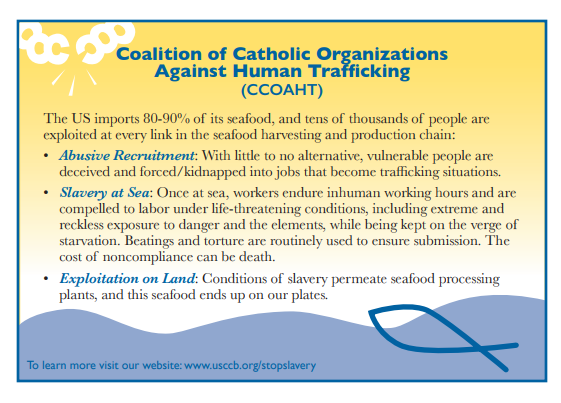Slave-free seafood label campaign
Catholic organizations press for positive change in the lives of those who work in the international fishing industry.
Catholic organizations press for positive change in the lives of those who work in the international fishing industry. The following article was published in the January-February 2018 issue of NewsNotes.
An estimated 45 million people worldwide are victims of sex or labor trafficking, which uses force or other forms of coercion, abduction, or deception for the purposes of exploitation. Two-thirds of the world’s human trafficking occurs in the Asia-Pacific region, according to the Global Slavery Index for 2016.
On November 27, the UN Security Council responded to recent reports of the slave trade of African migrants in Libya by approving a resolution which calls on countries to adopt anti-trafficking laws, ramp up efforts to investigate and dismantle criminal networks and provide greater support for survivors of slavery.
The seafood supply chain, in particular, is known to be rife with trafficking, from catching fish to processing and shipping it for export. Coupled with global demand for cheap seafood, lawless conditions at sea enable this modern slavery to flourish.
Thailand is the world’s third-largest seafood exporter. A Pulitzer Prize-winning investigative report by The Associated Press in 2016 found that some seafood caught and processed by trapped and enslaved workers on Thai boats—mostly migrants from Myanmar and Cambodia—was shipped to the United States for sale at supermarkets and pet food stores.
The AP report includes details of what workers endure at sea: 18 to 20–hour workdays, seven days a week; hazardous and life-threatening conditions; inadequate food and blatant disregard for their basic medical needs and injuries. Employers routinely beat and torture workers to force compliance. Some workers are held at sea for years on large fishing vessels because of a lack of regulation. On land, women and even children working in the seafood processing and canning facilities are subjected to long hours, unsafe conditions, physical abuse and neglect of injuries.
As the largest importer in the world, the United States is in a unique position to demand information on the production of goods we use every day. As Catholics, we believe in the dignity of every human life and vehemently oppose human trafficking and modern-day slavery as it contravenes basic human dignity.
To commemorate the International Day for the Abolition of Slavery on December 2, the Coalition of Catholic Organizations Against Human Trafficking launched a letter campaign to ask seafood producers, distributors and seafood retailers, including Bumblebee Seafood and Chicken of the Sea, to make public, through packaged product labeling, their efforts to fight human trafficking in their product supply chains. A label on seafood packaging declaring the chain of production to be “slave-free” would provide consumers the information needed to make moral purchasing decisions.
The coalition is facilitated by the U.S. Conference of Catholic Bishops and consists of over 30 national and international Catholic agencies, including the Maryknoll Office for Global Concerns.
To support the request for slave-free seafood labels, the Maryknoll Office for Global Concerns and other members of the coalition distributed a “Labeling for Lent” survey in 2017, asking consumers if slave-free labeling would affect purchases. Over 2,200 people responded and the results showed that 99 percent of consumers want companies to take steps to engage in ethical business practices, 98 percent want their packaged seafood to be labeled, and 97 percent said labels would influence their purchasing decisions.
“Catholics are becoming increasingly aware of the collective power they possess as consumers to press for positive change in the lives of those who catch our fish. As my coalition colleagues have remarked, ‘we are asking the seafood industry to do better. The companies that do will be supported by consumers,'” said Hilary Chester, Director of Anti-Trafficking at the U.S. Conference of Catholic Bishops.
The consumer survey built upon a 2016 Lenten postcard campaign in which supporters of the Maryknoll Office for Global Concerns and other members of the coalition mailed a total 15,000 postcards to U.S. seafood retailers urging them to examine their supply chains and commit to a product free of slave labor.
Faith in action:
- January is Human Trafficking Awareness Month. The coalition offers a toolkit of educational resources as well as prayers for celebrating the feast day of St. Josephine Bakhita on February 8 at http://bit.ly/2kZBFem
- Greenpeace has ranked 20 well-known canned tuna brands that can be found in grocery stores in the U.S. based on how sustainable, ethical, and fair their tuna products are for our oceans and for the workers that help get the products to store shelves. http://www.greenpeace.org/usa/oceans/tuna-guide/

